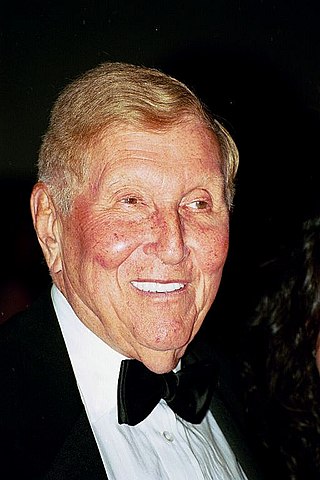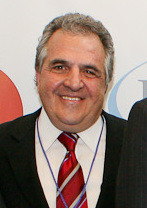
Paramount Pictures Corporation, doing business as Paramount Pictures is an American film and television production and distribution company and the namesake subsidiary of Paramount Global. It is the sixth-oldest film studio in the world, the second-oldest film studio in the United States, and the sole member of the "Big Five" film studios located within the city limits of Los Angeles.

Sumner Murray Redstone was an American billionaire businessman and media magnate. He was the founder and chairman of the second incarnation of Viacom, chairman of CBS Corporation, and the majority owner and chairman of the National Amusements theater chain.

Gulf and Western Industries, Inc. was an American conglomerate. The company originally focused on manufacturing and resource extraction, but it began purchasing a number of entertainment companies beginning in 1966 and continuing through the 1970s. Most notable among the acquisitions were film studio Paramount Pictures in 1966, television studio Desilu Productions in 1967, arcade and later videogame manufacturer Sega in 1969, book publisher Simon & Schuster in 1975, and a number of music labels including Dot Records. Some of these properties were reorganized under the Paramount brand, with Dot Records becoming the nucleus of Paramount Records and Desilu being renamed Paramount Television.

Major film studios are production and distribution companies that release a substantial number of films annually and consistently command the significant share of box office revenue in a given market. In the American and international markets, the major film studios, often known simply as the majors or the Big Five studios, are commonly regarded as the five diversified media conglomerates whose various film production and distribution subsidiaries collectively command approximately 80 to 85% of U.S. box office revenue. The term may also be applied more specifically to the primary motion picture business subsidiary of each respective conglomerate.

Republic Pictures Corporation was an American film studio corporation that originally operated from 1935 to 1967, based in Los Angeles, California. It had production and distribution facilities in Studio City, as well as a movie ranch in Encino.

CBS Studios, Inc. is an American television production company which is a subsidiary of the CBS Entertainment Group unit of Paramount Global. It was formed on January 17, 2006, by CBS Corporation as CBS Paramount (Network) Television, as a renaming of the original incarnation of the Paramount Television studio.

Brian Robbins is an American businessman, film and television producer, director, executive and current co-CEO of Paramount Global. He has been the president and CEO of Paramount Pictures and Nickelodeon since 2021. He was named the co-CEO of Paramount Global in April 2024.

Paramount Television Studios, formerly the second incarnation of Paramount Television, is the television arm of American film studio Paramount Pictures, a division of Paramount Global, founded on March 4, 2013 by its predecessor, Viacom, following an emerging vigorous business with the technological expansion of television via streaming services. Paramount also recognized that television could give them little to fall back on when films fail, except for studio stage rentals.

The Paramount Television Service, Inc. was the name of a proposed but ultimately unrealized "fourth television network" from the U.S. film studio Paramount Pictures. It was a forerunner of the later UPN, which launched 17 years later.

Paramount Global Content Distribution is the international television distribution arm of American media conglomerate, Paramount Global, originally established in 1962 as the international distribution division of Desilu Productions. With the sale of Desilu to Gulf+Western, then-owners of film studio Paramount Pictures, in 1968, the division evolved into Paramount's first foray into the international television industry in the 1970s.
Spelling Television Inc. was an American television production company that went through several name changes. It was originally called Aaron Spelling Productions, then Spelling Entertainment Inc. and eventually part of Spelling Entertainment Group. The company produced popular shows such as The Love Boat, Dynasty, Beverly Hills, 90210, 7th Heaven, Melrose Place and Charmed. The company was founded by television producer Aaron Spelling on October 25, 1965. The company is currently an in-name-only unit of CBS Studios. A related company, Spelling-Goldberg Productions, co-existed during a portion of the same time period and produced other well-known shows such as Family, Charlie's Angels, Starsky & Hutch, and Fantasy Island but these series are not part of the modern day library now owned by Paramount Global. Another related company, The Douglas S. Cramer Company co-existed during a portion of the same time period, produced shows like Wonder Woman, Joe and Sons, and Bridget Loves Bernie and television films like Dawn: Portrait of a Teenage Runaway.
Viacom Productions was a television production arm of Viacom International. Viacom Enterprises was also a movie production, and a sports production. The division was active from 1971 until 2004, when the company was folded into Paramount Television 10 years following Viacom's acquisition of Paramount Pictures, and led Perry Simon to move itself to Paramount for a production deal.

James N. Gianopulos is an American businessman. He served as chairman and CEO of 20th Century Fox and most recently as chairman and CEO of Paramount Pictures until his departure in September 2021.
CBS Films Inc. was an American film production and distribution company founded in 2007 as a subsidiary of CBS Corporation and was considered a mini-major studio up until 2019.

The original incarnation of Viacom Inc. was an American mass media and entertainment conglomerate based in New York City. It began as CBS Television Film Sales, the broadcast syndication division of the CBS television network in 1952; it was renamed CBS Films in 1958, renamed CBS Enterprises in 1968, renamed Viacom in 1970, and spun off into its own company in 1971. Viacom was a distributor of CBS television series throughout the 1970s and 1980s, and also distributed syndicated television programs. The company went under Sumner Redstone's control in 1987 through his cinema chain company National Amusements.
DreamWorks Pictures is an American film studio and distribution label of Amblin Partners. It was originally founded on October 12, 1994, as a live-action film studio by Steven Spielberg, Jeffrey Katzenberg, and David Geffen, of which they owned 72%. The studio formerly distributed its own and third-party films. It has produced or distributed more than ten films with box-office grosses of more than $100 million each.
Gordon T. Stulberg was a Canadian-American film executive and lawyer, best known for a long stint as president and chief operating officer of 20th Century Fox and Cinema Center Films and PolyGram Pictures.

The first and original incarnation of Paramount Television was the name of the television production division of the American film studio Paramount Pictures, that was responsible for the production of Viacom television programs, until it changed its name to CBS Paramount Television on January 17, 2006, due to the Viacom split.













